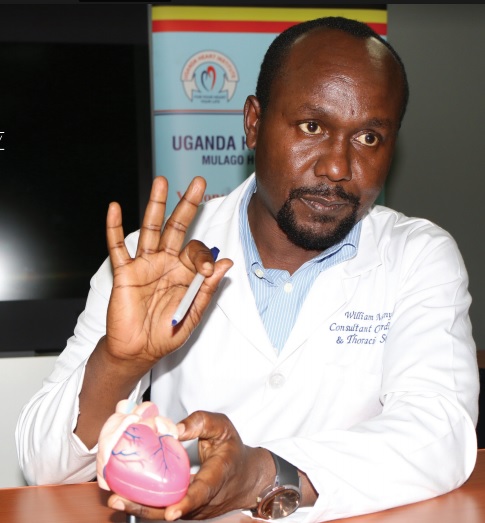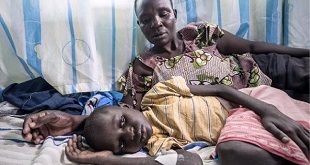
Dr Manyilirah says patients who undergo the bypass surgery should be able to leave hospital in about five to six days but he extended hospital stay in order to monitor the patients well. While the first patient left on the eighth post-operative day, Ndawabo left on the ninth day.
“One spent three days in ICU and another four, but a day or two in ICU is enough under normal circumstances,” he said, noting that the procedure alone lasts five to six hours.
Until now, the Institute which received about 500 patients with coronary artery disease last year, has been doing mainly coronary angiography – a procedure that uses a contrast dye and X-ray pictures to detect blockages in the coronary arteries. At least four to five patients undergo this procedure every week.
Some of these patients undergo a stent operation, where a small metal mesh tube that is expanded inside the artery is placed to allow blood to flow efficiently.
Eventually having bypass surgery offered at the Institute means patients will not incur huge costs on medical services abroad.
Challenges ahead
But Dr. Tom Mwambu, one of the surgeons behind the procedure told journalists on Feb.09, that the challenge is that people who want treatment may not get it at the time they need it.
Mwambu, a consultant surgeon who trained both in Japan and India, says despite upgrading the Institute to start doing complex heart procedures in 2013, Uganda Heart Institute only has one operating theatre and only one catheterisation lab.
He said while they have capacity in terms of human resource to do three bypass surgeries per week, the facilities they need to do this are lacking.
“Many patients are waiting. They should be attended to when they walk in but we can’t work on them immediately. Even the critical care team can’t handle many patients at once,” he said. He said ideally, the country should install more theatres.
Dr. John Omagino, the Institute’s Executive Director agrees and says they plan to set up more theatres once they get their independent facility and shift from Mulago Hospital complex where they are currently attached. Already construction of the facility valued at $65million is under way.
“We are now an autonomous institution but we are still transitioning from being under Mulago Hospital. When we get a new home, we will get more theatres, more labs and recruit more staff,” he said.
Currently the institute has four surgeons and two are in training. It has 12 cardiologists, eight for adults and four for children.
Omagino says of the 12,000 patients visiting the institute annually half are found to have heart disease and therefore have to be treated by that small team. And, 85% of all heart diseases can be controlled with simple lifestyle changes.
For Coronary artery disease for instance, the risk factors are uncontrolled high blood pressure, smoking, a lot of alcohol consumption, diet high in fat, obesity, family history and aging.
Manyilirah explains that blockage results from a chronic process involving slow reduction in the size of the lumen of the blood vessel caused by deposition of abnormal fats or cholesterol. With time as it builds up it narrows the lumen.
What sparks a heart attack is a clot caused by turbulence in blood flow at the narrowed segments of the artery and the heart ends up not receiving blood leading to irregular heart beat which gives little blood to the body.
“I was anxious when Dr William told me about this,” Mr Ndawabo told The Independent on Feb.09 when he was being discharged from hospital, “I feared it was difficult.”
“My health is now good. I can talk, I can eat, I can walk. I am satisfied,” the man who is now part of the history of cardiology in Uganda said. He is also unusually lucky.
 The Independent Uganda: You get the Truth we Pay the Price
The Independent Uganda: You get the Truth we Pay the Price



The Surgery done by the doctors at the Uganda Heart Institute, Mulago exhibited the high level of skill we have as a country. The kind of operation they did has not been done in the East African Region, not event Nigeria and Ghana.
Bravo to the heart surgeons and medical team! Bravo to UHI administration! Bravo to government and the parliamentarians for recognising the great work and supporting the acquisition of more medical equipment and a new home for UHI. This is the way to go.
Appreciating people while they are still alive is a good thing instead of paying tribute to people when they have already died.
Thanks to The Independent team for the quality and informative news. We learn a lot from such stories.